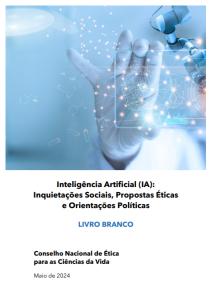
Open Access
Recomendação sobre a Ética da Inteligência Artificial
Corporate author: UNESCO [8005]
Document code: SHS/BIO/PI/2021/1
Collation: 43 pages : illustrations
Language: Portuguese
Also available in: English, Français, Español, 汉语, العربية, Lietuvių kalba, монгол хэл
Year of publication: 2022
ACESSO Versão português: https://unesdoc.unesco.org/ark:/48223/pf0000381137_por
Esta Recomendação aborda questões éticas relacionadas ao campo da inteligência artificial, na medida em que aquelas estão dentro do mandato da UNESCO. Ela aborda a ética da IA como uma reflexão normativa sistemática, com base em um marco holístico, abrangente, multicultural e em evolução de valores, princípios e ações interdependentes que podem orientar as sociedades para que lidem de forma responsável com os impactos conhecidos e desconhecidos das tecnologias de IA sobre seres humanos, sociedades, meio ambiente e ecossistemas, oferecendo-lhes uma base para aceitar ou rejeitar essas tecnologias. Ela considera a ética como uma base dinâmica para a avaliação e a orientação normativa das tecnologias de IA, fazendo referência à dignidade humana, ao bem-estar e à prevenção de danos – como uma bússola e tendo como fundamento a ética da ciência e da tecnologia

PORTUGAL – CONSELHO NACIONAL DE ÉTICA PARA AS CIÊNCIAS DA VIDA
LIVRO BRANCO Inteligência Artificial (IA): inquietações sociais, propostas éticas e orientações políticas – 2024
A Inteligência Artificial (IA) está fortemente presente no amplo domínio das ciências da vida, em particular no âmbito da saúde humana, em que tem vindo a ser introduzida a um ritmo acelerado e numa crescente diversidade de áreas de atuação, especialidades médicas e atos clínicos. Torna-se assim complexo proceder à necessária sistematização metodológica das suas principais áreas de intervenção, que permita tecer uma reflexão ética sobre as implicações com maior impacto da IA no setor da saúde. No Livro Branco «Inteligência Artificial (IA): inquietações sociais, propostas éticas e orientações políticas», o CNECV propõe uma estruturação em cinco planos ou grandes áreas de intervenção, distintas, mas que se intersetam: (1) investigação biomédica; (2) assistência clínica; (3) gestão hospitalar; (4) administração da saúde pública; (5) ensino/educação em saúde. Em cada um destes planos, é destacada uma das modalidades de intervenção da IA que se torne particularmente preponderante no espaço visado, sendo certo que qualquer aplicação possível da IA à saúde humana se exerce concomitantemente em todos os cinco planos privilegiados. DESCARREGAR PUBLICAÇÃO

EU AI ACT: FRIST REGULATION ON ARTIFICIAL INTELLIGENCE
No âmbito da sua estratégia digital, a UE pretende regulamentar a inteligência artificial (IA) para garantir melhores condições para o desenvolvimento e utilização desta tecnologia inovadora. A IA pode criar muitos benefícios, como melhores cuidados de saúde; transportes mais seguros e limpos; fabricação mais eficiente; e energia mais barata e mais sustentável.
Em abril de 2021, a Comissão Europeia propôs o primeiro quadro regulamentar da UE para IA. Diz que os sistemas de IA que podem ser utilizados em diferentes aplicações são analisados e classificados de acordo com o risco que representam para os utilizadores. Os diferentes níveis de risco significarão mais ou menos regulamentação.
ACESSO: (Inglês) https://www.europarl.europa.eu/doceo/document/TA-9-2024-0138_EN.html

ARTIFICIAL INTELLIGENCE AND DEMOCRACY
Corporate author: UNESCO Office Montevideo and Regional Bureau for Science in Latin America and the Caribbean [603], Latin American Social Sciences Council [14]
Person as author: Innerarity, Daniel [author] [2]
Document code: MTD/SHS/2024/PI/01 Rev.
Collation: 23 pages
Language: English
Also available in: Español
Year of publication: 2024
Licence type: CC BY-SA 3.0 IGO [13303]
Type of document : programme and meeting document
ACESSO: Inteligencia artificial y democracia – UNESCO Digital Library
UNESCO’s Recommendation on the Ethics of Artificial Intelligence1 de la UNESCO, adopted by all Member States in November 2021, is the first global policy framework for artificial intelligence (AI) and outlines different aspects of this technology that directly impact political life. The initial considerations of the Recommendation outline the potential ramifications of AI across diverse domains, notably its implications for democracy. This report builds on these analyses and recommendations, aligning with the core values and principles outlined in the Recommendation. It delves into the current and potential impact of artificial intelligence on democracy and the benefits that both artificial intelligence and digitalization, in general, could bring to enhancing collective decision-making processes.

ETHICAL IMPACT ASSESSMENT: A TOOL OF THE RECOMMENDATION ON THE ETHICS OF ARTIFICIAL INTELLIGENCE
Corporate author: UNESCO [8041]
Document code: SHS/REI/BIO/REC-AIETHICS-TOOL-EIA/2023
DOI: https://doi.org/10.54678/YTSA7796
Collation: 51 pages
Language: English
Year of publication: 2023
Licence type: CC BY-SA 3.0 IGO [13303]
Type of document: programme and meeting document
To avoid a backlash against these outcomes and to allow innovation to continue to flourish, AI should be developed in line with the common good in an ethical manner. This is the call that UNESCO has made since 2021, when its 193 Member States adopted the first global standard on the ethics of AI. The Recommendation on the Ethics of AI provides a framework to ensure that AI developments align with the promotion and protection of human rights and human dignity, environmental sustainability, fairness, inclusion and gender equality. It underscores that these goals and principles should inform technological developments in an ex-ante manner. To support effective implementation, UNESCO developed two instruments, the Readiness Assessment Methodology and the Ethical Impact Assessment. In this publication, we are pleased to unveil the Ethical Impact Assessment. This instrument has two goals: First, to assess whether specific algorithms are aligned with the values, principles and guidance set up by the Recommendation. And second, to ensure transparency by calling for information about AI systems and the way they were developed to be available to the public. This is not how it works today, even for basic information about AI safety and reliability.

Online
Open Access
programme and meeting document
Neurotecnologías y derechos humanos en América Latina y el Caribe: desafíos y propuestas de política pública
Corporate author: UNESCO Office Montevideo and Regional Bureau for Science in Latin America and the Caribbean [602]
Person as author: Andorno, Roberto [author] [4]
Document code: MTD/SC/2023/PI/05
Collation: 42 pages
Language: Spanish
Year of publication: 2023
El presente informe fue preparado por encargo de la UNESCO (Oficina Regional para América Latina y el Caribe). En primer lugar, el Informe destaca el notable desarrollo neurocientífico que ha tenido lugar en los últimos años en varios países latinoamericanos, tanto en actividades clínicas como de investigación. En segundo lugar, al abordar la perspectiva de derechos humanos, el informe identifica cuatro derechos que están llamados a jugar un rol central en la materia: la privacidad mental, la integridad mental, la identidad personal y la libertad cognitiva. El documento presenta a continuación las diversas propuestas de regulación de la materia por parte de distintos organismos internacionales y regionales latinoamericanos, así como a nivel de los órganos legislativos de países de la región, enfatizando el liderazgo de la UNESCO, que puede ser una fuerza motriz en materia de neurotecnología dentro del sistema de las Naciones Unidas, gracias a su mandato único y su experiencia en bioética y ética de la ciencia y la tecnología.

